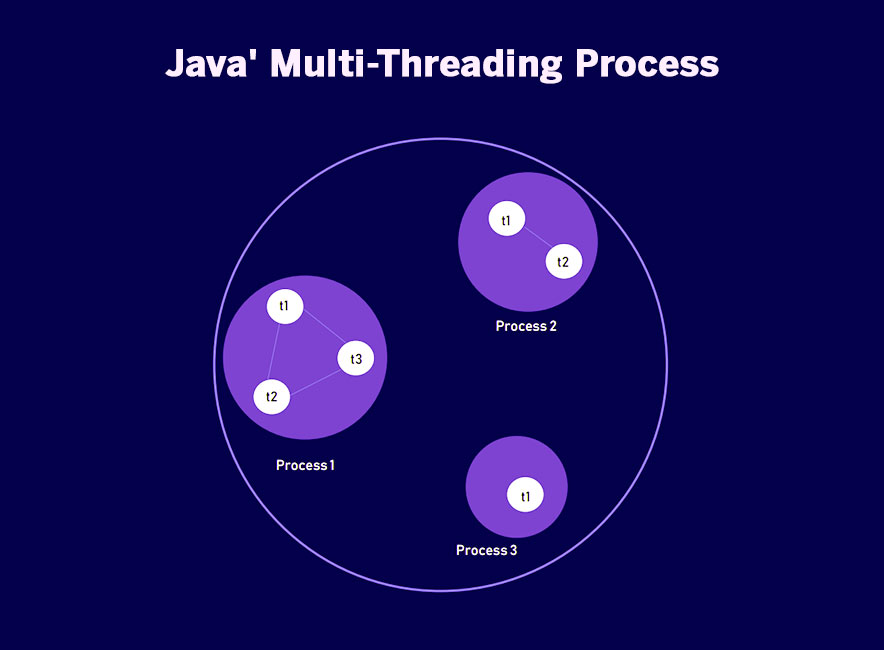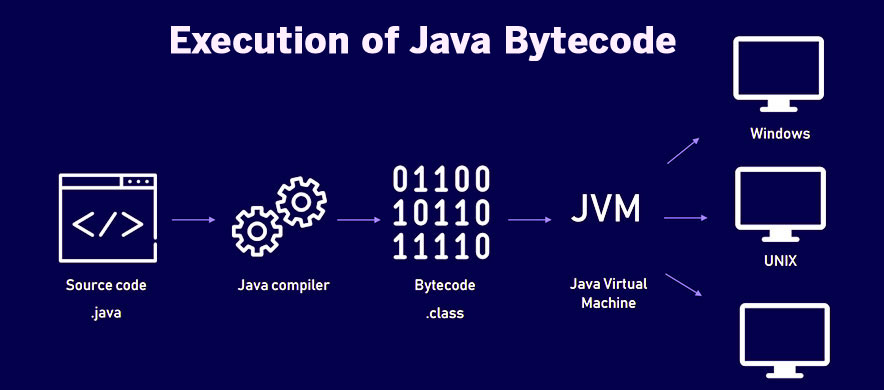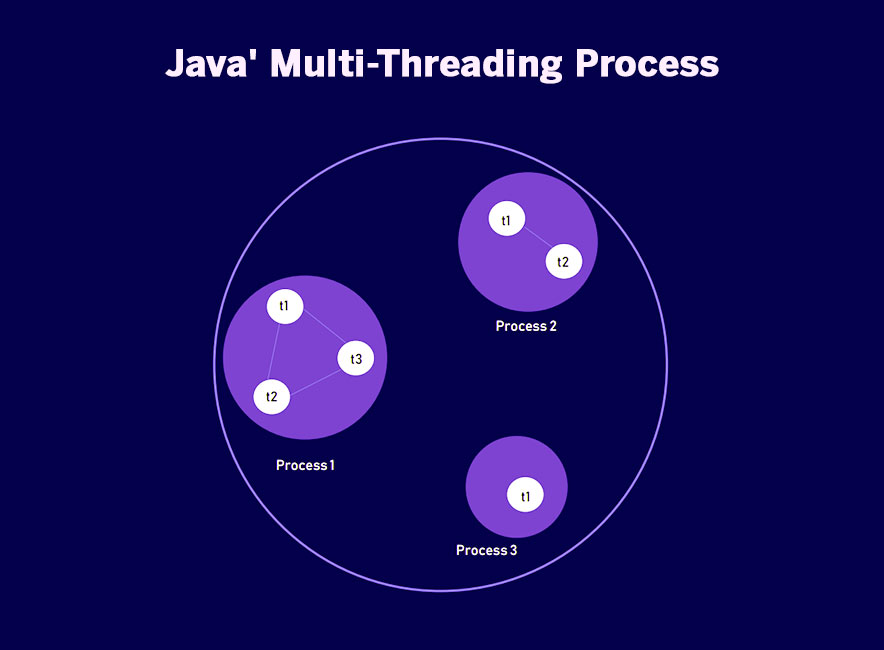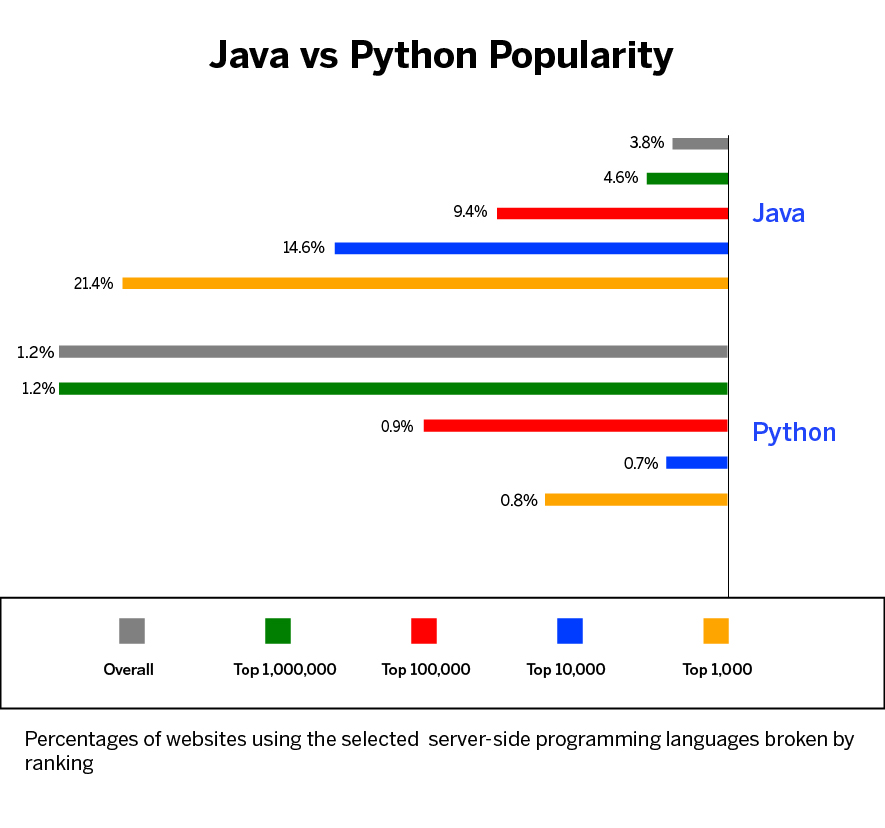The battle between the brew of the app development world Java and the Swiss Army Knife of the coding world called Python is not new. Java vs Python- the most sorted programming language though different from each other shares similarities too. The use cases of both languages are different from each other along with fan […]
Updated 15 February 2024

Director at Appventurez
The battle between the brew of the app development world Java and the Swiss Army Knife of the coding world called Python is not new.
Java vs Python- the most sorted programming language though different from each other shares similarities too. The use cases of both languages are different from each other along with fan bases too. Irrespective of these parameters, the battle of Python vs Java will remain a fuss for the coming years too.
An old lad in the world of mobile app development knows the difference between Java and Python. Someone entering the world just now should know the differences between Java and Python, which is better for prospects.
Hence, if you are getting started with your first mobile application or maybe planning to develop another one, the following scrolls about Python vs Java will help you.
Let’s get started-
Created by James Gosling (Sun Microsystems), it is a multi-platform, general-purpose, network-centric & object-oriented programming language. The language is meant to be used for a wide range of applications, from the web and mobile to enterprise applications.
The language offers a handful of advantages but is also bound with numerous disadvantages.
Just like Java vs Kotlin- what to consider for Android apps, the battle between Java vs Kotlin is also going to be fierce in the coming scrolls.
Java is popularly known for being object-oriented programming (OOP) language. OOP is a coding concept that showcases data type, its structure, set of functions too. Through these coding concepts, the data structure simply becomes an object that can be further manipulated for creating relationships between various objects.

Java is the apple’s eye for entrepreneurial applications. When we counter why Python is better than Java for enterprise applications, the latter supports a plethora of libraries. It helps in building enterprise system building blocks helping iOS and Android app developers to create functions a company might require.
Also, the language is comparatively less costly as there will be no specific hardware infrastructure requirement.
Java’s cross-platform app development capabilities are denoted by its Write Once Run Anywhere catchphrase. Window programming coding can easily run another application on any other platform supported by Java Virtual Machine (JVM).

When it comes to the difference between Java vs Python, the former has an integrated mechanism meant for sharing data & programs among multiple computers. The mechanism is required for improved performance and efficiency.
Furthermore, Java also offers external APIs for distribution purposes, unlike other languages. Another of its distributed computing called Remote Method Invocation (RMI) renders Java benefits like security, and platform independency along with object-oriented programming. Moving on, it also supports Socket programming and CORBA for object sharing between written programs in different languages.
Another parameter showcasing why Python is better than Java is due to Automatic Memory Management (AMM). This memory management is used in Swift programming language, garbage collection along with for applications that handle memory allocation & deallocation.
A thread is the smallest processing unit in the context of processing. To maximize CPU time, Java runs these processing units in a process called multithreading.

These threads share the same memory area easing the task of switching between them. The process is extremely useful for animated and gaming-like applications.
Java is a hit till now due to the constant support from its community. Also, Java’s fresh and new versions are released with interesting features.
When justifying the difference between Java vs Python which is better for the future, the former one has a large ecosystem of tested libraries & frameworks.
Java which has been taken over by Oracle announced that they will be charging some amount for its Standard Edition 8 for “business, production or commercial” use.
Hence, if one is willing to get new updates and bug fixing needs to pay as per the number of users or processors.
When it comes to high-level programming languages, robustness often affects the performance too.
Talking about the difference between Java vs Python, the latter is a high-level object-oriented programming language. The language has built-in data structures that are combined with dynamic binding and typing.
Due to all this, the language tends to be an ideal choice for rapid mobile app development processes. Furthermore, the language also tends to offer modules and packages for system modularity and reusable codes.
Also, one of the advantages of Python over Java is that it requires a few lines of code. Its readability and simplicity make it an ideal choice for beginners.
Python showed up with a plethora of libraries containing code for different purposes like documentation generation, unit testing, regular expressions, web browsing, databases, threading, email, image manipulation, CGI, and many more. This results in wiping out the requirement of writing complete code manually.
One of the advantages of Python over Java is that it can be extended to other languages. This resulted in writing code in languages like C++ or C.
Python being a high-level object-oriented programming language also focuses on code readability. This makes the language quite versatile, well-structured, neat, and easy to use while opening up the scope for learning, and reading.
Python can be downloaded for free while being easy for writing code in minutes. Also, by using Python, development becomes convenient and easy. Also, Python’s community is said to be the best, large, and most active.
The next difference when it is to Python vs Java battle is the former simplicity and extensive libraries offer developers better productivity just like C++ and Java. apart from that, developers are not required to write more too.
Python is the basis of new platforms like Raspberry Pi, which reflects how IoT can become the future. IoT is the most cherished and talked about technology taking a round of applause in the market. And the support of Python makes it invincible.
Python is easy to read, learn and understand along with its codes too. This can be served as an advantage of Python over Java that it does not require braces to define blocks but makes indentation a mandatory thing.
why Python is better than Java sums up as the former supports both the procedural and object-oriented programming paradigms. Through its functions of code reusability, classes, and objects, the model helps in modeling the real world.
In the battle of Python vs Java, the former is similar when it comes to the Write Once Run Anywhere approach.
When we highlight Java vs Python performance, the latter one shows speed limitations. As an interpreted language, Python is often analyzed slower than other popular programming languages.
But when speed can be negotiated, Python is just fine to implement in the project.
Talking about another difference between Java vs Python, then threading arises as an issue with Python. Due to Global Interpreter Lock (GIL), threading becomes less good with it.
Unfortunately, Python is not native to a mobile app development environment and ends up being a weak language for mobile computing. Both the platform- Android and iOS, do not see Python as an official programming language.
But that does not mean it cannot fit into the app development ecosystem, it can be used in it but require additional efforts too.
For memory-intensive tasks, Python is not seen as an apt choice. Its flexibility of the data types turns it into an unsuitable choice which simply resulted in high memory consumption.
Python carries some limitations with database access as compared to other technologies like ODBC and JDBC. Python’s database access layer is a little underdeveloped and at its primitive stage. Due to this, the language cannot be used for an entrepreneurial app development process that plays with the smooth interaction of complex legacy data.

The following stats are just the beginning of the Python vs Java battle. But amid their differences, similarities between them make the decision more challenging.
The similarities between the competitor’s Python vs Java are-
When talking about Python web development and Java web development, both languages are widely accepted for backend web development processes. Backend web development focuses on the system that is designed to run on the server side rather than working on the client browser.
On one hand, Java offers outstanding support for creating server applications while providing a massive ecosystem. However, websites that are made using Java are safer but slower in performance.
Next in the line, Python offers both Django and Flask frameworks. Both of these frameworks are apt choices for developing backend web applications.
Java vs Python might be a battle but at the same time, both of them share similarities too.
Machine learning is getting its fair share of fame in the market. Due to this programmers and developers often look for languages that are compatible with Machine learning.
Java is seen as a preferred language for machine learning due to its easier debugging process. The language is used for large-scale to entrepreneurial-level applications and is also used for deep learning.
Python, on the other hand, is a widely-used programming language for machine learning. Around 70% o development in AI and ML is being done through Python. The machine-learning similarities make Java vs Python which is better for the future a challenging pick.
Java is now used for customized Hadoop for data science projects. Hadoop is used for collecting data from various sources. Meanwhile, Python is the most preferred choice for data science.
Here is the list of differences between both the beast Java and Python.
Let us now counter them one by one in detail-
Though both Java and Python compile to bytecode and run in virtual machines there is a difference between them too. Java compiles bytecode in advance and then distributes it whereas Python complies with codes during runtime.
Also, another difference that surpasses the performance graph of Python over Java is a binary tree that runs test way faster in Java.

Both Java and Python are seen as the dominating programming languages. But when choosing one from them, considering GitHub stars can save the deal.
As per Github’s October, Python has managed to secure its position as the most-used language beating Java with the second position. Also, as per the developer survey conducted in 2018, Python is seen as the fastest-growing computer programming language.
When discussing the difference between Java vs Python, Python marked itself as a dynamically typed language that eliminates the need to determine variable types. The interpreter further infers these types to make checks at runtime. The process overall results in easier syntax somehow similar to the English language.
Also, Python does not require the use of enclosing braces and indentation rules making the code readably easy and apt for beginners.
Java being the statically typed language strictly follows syntax rules. This makes it mandatory to declare variable types where the code will not compile too. Because of being statically typed, many of the developers do not find it comfortable due to indentation rules with large codebases.
It has been seen that Python got an edge over Java in terms of better job opportunities and salary prospects.
Here is the job categorization of both – Java and Python
Job roles for Java
Job roles for Python
Though the figures are the mirror of what is in demand but at the same time, we being the topmost mobile app development company find Salary and Job areas the negotiable thing when choosing the programming language.
Java and Python both are Object-oriented programming languages but Java uses static types of objects whereas Python is more dynamic.
The difference in types decides how to write, design and troubleshoot programs more fundamentally.
Whitespace is absent in Java and is a part of Python’s syntax.
Python makes use of tabs for nesting along with a full colon to start loops and conditional blocks. On the other hand, Java ignores whitespace and further uses semicolons, curly braces, and parentheses.
However, the battle between Python vs Java is followed by arguments like which languages’ code is easy to read, static vs dynamic typing, etc. According to some developers, Python is concise and uniform whereas Java is limited with formatting choices.
But Python’s whitespace use ends the debate.
Comparing Java vs Python, the latter one revolves around the linear and less dispersed coding format.
When talking about Python, the language does not require the use of semicolons at every station’s end. The process then results in making the language easier to read & understand when comparing it with its competitor Java.
A blockage is something that is created as soon as a declaration is commanded.
In the case of Python, when the loop reaches the end, it automatically gets out whereas, in Java, the process of the loop is compound. The demonstrations in Python are quite clear, transparent, and concise whereas Java is a little tedious to work with. Apart from that, Python can run the script more easily and quickly whereas Java requires one entry point.
Another difference between Java and Python is that the former provides a run-time environment for code operation. Due to this, the architectural experience for the developers becomes seamless too. The architecture converts Java bytecode into machine learning which is not the case with Python.
Python converts bytecode into machine code that is again stored in another folder. The process does not translate at runtime and later sends the bytecode across Python Virtual Machine.
Java’s JDBC (Java DataBase Connectivity) is active as compared to Python’s database access layers. Due to JDBC, Java gets the advantage of connecting with various databases such as SQOOP and SQL. This results in making Java an appropriate option for enterprise app development.
Both the programming languages- Java and Python are almost equal in terms of development options.
Java is seen as the most appropriate choice for-
Whereas Python is suitable for-
Java and Python both enjoy their share of support from their respective community.
Here are GitHub stars for-
![]()
Python currently has over 1637 user groups in 191 cities and 37 countries.
Here are Github stars for-
![]()
Java’s community is quite large and vibrant and has Java User Groups across the globe.
Another difference between Python and Java is that the latter one is not easy to use. The reason is that it does not follow dynamic program scripting which results in longer codes and is difficult to understand. On the other hand, Python codes are a little shorter following dynamic program scripting. Also, the codes are easy to understand.
So, these are the key differences showcasing the battle between Python vs Java.
With it, let us now figure out the use cases of both Java and Python.
Apps written on Java-
Apps written in Python
The mobile and web applications are enough to highlight the Java vs Python future. Both programming languages carry their set of good and bad things and are appropriate for particular kinds of projects.
With constant updates, refinements, and updations in these programming languages, the robustness and good things in the language can make a big impact.
Meanwhile, if you are in any doubt regarding which language is going to win the battle let our experts assist you with that. Contact us for more information.


Elevate your journey and empower your choices with our insightful guidance.

Director at Appventurez
Director and one of the Co-founders at Appventurez, Chandrapal Singh has 10+ years of experience in iOS app development. He captains client coordination and product delivery management. He also prepares preemptive requisites and guides the team for any possible issues on a given project.
You’re just one step away from turning your idea into a global product.
Everything begins with a simple conversation.